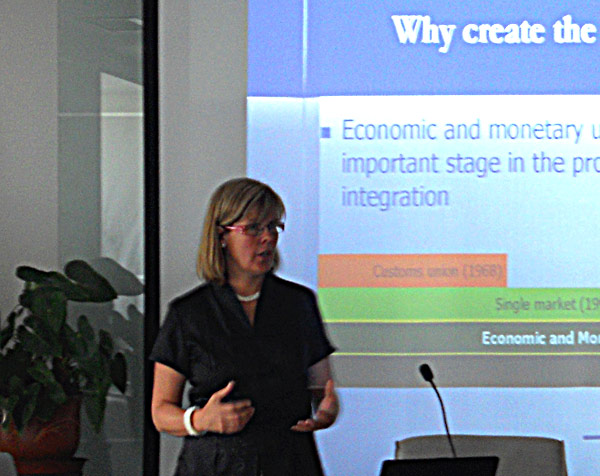EU Diplomat to China Talks about the Debt Crisis at IES

On May 24, 2012, Annika Melander, Head of the Economic and Financial Section of the EU Delegation to China came to the Institute of European Studies (IES), CASS, presenting her views on the current situation of the European debt crisis.
By opening her lecture, she went over the birth of the Euro and summarizes the following achievements of the single currency's first ten years: eliminating exchange-rate costs and currency fluctuations; enhancing price transparency, stability and comparability; lowering interest rates; taking up a position as an international currency; and building a European identity. At the same time, however, she also notes that there are some side effects, such as loss of policy tools for exchange rate and interest rate, thereby disappearance of national sovereignty over monetary policy; and cost of changeover to a new currency.
According to Melander, the debt crisis at present was caused by both external and internal factors. Externally, the US subprime crisis and the subsequent international financial crisis created an unfavorable environment for the EU economy. Internally, exceptional macroeconomic conditions, over-reliance on efficiency and rationality of markets, regulatory/supervisory weaknesses, and lax internal governance dealing with the emerging imbalances, among others, are to blame.
In order to overcome the crisis, Melander says, the EU, along with the IMF, are in the process of implementing the following measures: removing uncertainty about Greece and ensuring credible reforms in other vulnerable countries; reinforcing financial firewalls; repairing the financial-sector; strengthening new economic governance; and, carrying out reforms for growth and jobs.
She also mentions that while the debt crisis is a heavy blow to the EU economy, it also serves as an impetus for Europe to improve the design of the 'economic and monetary union' and push forward integration, referring to the successful signing of the fiscal compact. In that respect, the crisis is both a challenge and an opportunity.
Many of the IES scholars are interested in the Greek issue. Melander says that it is up to the Greek population to decide on its future development and whether Greece would prefer leaving the Euro zone. She hopes that the final decision will reflect the Greek people’s real choice as the first election results were somewhat contradictory, with polls suggesting that a very strong majority (70-80% of the population) are in favour of being in the euro zone, while at the same time many deserted the parties backing the programme that would make this possible.
Melander believes that if Greece was to give up its Euro membership, this would be manageable from an economic point of view for the rest of the euro area, but with markedly larger effects for Greece itself and would be a great pity for both sides politically.
- Back _articles: Polish Ambassador on Poland’s Internal and External Affairs at IES
- Next _articles: EU-China Youth Policy Dialogue in Chengdu